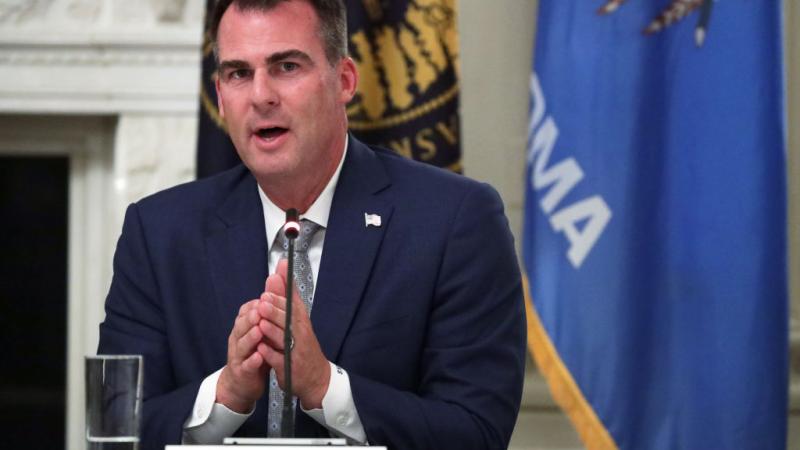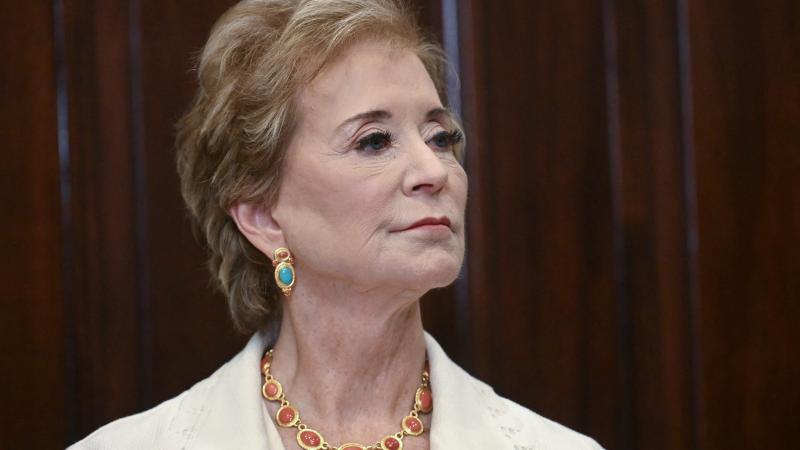Biden's plans for campus sexual misconduct regulations leave lawyers puzzled
Newspaper editorial boards and even Mike Bloomberg ask the president to leave Trump administration rules in place.
Last spring, the Trump administration finished its 18-month regulatory rule-making on Title IX sexual misconduct proceedings on college campuses.
The rules, which defined sexual harassment in education for the first time in federal law and required stronger protections for accused students, survived multiple court challenges before and after they took effect in August.
The Biden administration promised to look for ways to reverse the rules earlier this month. But legal experts told Just the News they are skeptical what the Department of Education could do short of another rule-making to overturn the last one.
Unlike the Obama administration's "guidance" documents starting in 2011, which warned colleges against allowing cross-examination and required a low evidence standard, the Trump administration crafted legally binding regulations.
Despite all the "heat and controversy and rhetoric" around the due process requirements in the new rules, all they did was "codify a long list" of court decisions that chipped away at elements of President Obama's guidance, University of San Francisco law professor Lara Bazelon said.
"I don't see them getting struck down" in court, she said. "I don't even see them being a close call for judges."
Kimberly Lau, who leads the college discipline practice at Warshaw Burstein, said the Department of Education could suspend enforcement of the regulation but colleges would then be vulnerable to litigation for ignoring the rules.
That raises the question of whether the Biden administration would punish colleges that continue to follow its predecessor's rules, she said: "These are not just guidance documents anymore."
Obama rules created 'confusion, uncertainty, and sometimes a guilty-upon-accusation environment'
Biden has long defined his political career on protecting women, but his accomplishments have a mixed legacy.
The Violence Against Women Act of 1994, which he shepherded through Congress, has since faced feminist scrutiny for treating domestic violence as a law enforcement issue, which may have ironically reduced reporting of abuse.
Reauthorization language for VAWA has also been criticized for watering down the definition of domestic violence and incentivizing romantic partners to lie. Feminist Wendy McElroy, who lost sight in one eye from domestic violence, warned that the language represents the "criminalization of normal life," including common squabbles in relationships.
Joe Biden has claimed that President Obama specifically tasked him with devising policy on campus sexual misconduct before they were elected in 2008. As vice president, Biden compared supporters of due process for accused students to the "Nazis" who marched in the Charlottesville "Unite the Right" rally.
The White House issued an executive order March 8 directing Education Secretary Miguel Cardona to review its predecessor's Title IX regulation "for consistency with governing law" by the end of April.
All "agency actions" must follow President Biden's policy that "all students should be guaranteed an educational environment free from discrimination on the basis of sex," including sexual harassment, the order said.
"As soon as practicable," Cardona must review "existing guidance and issue new guidance as needed" on the regulation. He must also consider "suspending, revising, or rescinding" agency actions that violate Biden's policy, or start a new rulemaking to that effect. A related order created a White House Gender Policy Council that includes Cardona.
A Department of Education spokesperson did not answer what changes the administration could make, short of a new rulemaking, that could pass muster with courts.
"The Biden-Harris administration – and the Office for Civil Rights (OCR) – is fully committed to equal educational access for all students," the spokesperson said in a prepared statement. "OCR intends to meet the 100-day deadline set forth in the Executive Order in providing the findings of this review to the Office of Management and Budget."
The Trump administration rules, crafted under Education Secretary Betsy DeVos, have shown cross-ideological appeal.
The Republican leaders of the House and Senate education committees urged Cardona last week to keep the regulation "in place and unchanged."
The rule-making was "a much needed change from years of non-binding guidance documents issued by the Department without stakeholder feedback," Sen. Richard Burr and Rep. Virginia Foxx wrote. The prior system "created confusion, uncertainty, and sometimes a guilty-upon-accusation environment at many schools."
The regulation protects alleged victims from having to face their attackers, but both parties benefit from the procedural requirements, the lawmakers said: written notice of allegations and "equal opportunity" to choose their advisors and review evidence.
Burr and Foxx noted that the late Supreme Court Justice Ruth Bader Ginsburg publicly criticized sexual misconduct proceedings for lacking due process. DeVos also cited Ginsburg when she introduced the new rules.
Former Democratic presidential candidate Michael Bloomberg also called on Cardona to back off last week. The DeVos regulation "wasn’t perfect, but it was progress," he wrote. Bloomberg would go even further, getting colleges "entirely out of the business of investigating and adjudicating criminal misconduct."
The former acting chief of the Office for Civil Rights, who helped draft the Title IX proposal in 2017, contrasted President Biden's proposed Title IX policy with his cautious approach to sexual harassment allegations against New York Gov. Andrew Cuomo.
Candice Jackson wrote in National Review that the president cares more about due process for Cuomo than for students. As vice president he "pushed unreliable statistics to justify showing zero concern for the due-process rights of respondents."
She emphasized that the regulation protects free speech on campus as well. Colleges are no longer required to "put students and professors through Title IX investigations for an off-color joke or sex-related academic discussions."
The Los Angeles Times editorial board called for "minor adjustment" of the regulation but "certainly not a swing back" to the Obama administration's guidance, which "ignored common traditions of due process" while prompting colleges to favor accusers.
The editors credited DeVos with protecting "key aspects" of Obama's rules, especially that accusations are "taken seriously." They urged the president to "avoid the extremes of his days as vice president and instead aim for a nuanced set of procedures that is fair to both sides."
The Washington Post editorialized Sunday that "there are some things worth saving in these educational rules — and so the administration should tread carefully."
Law professors have faulted the previous administration's guidance for causing "an overcorrection" that harmed accused students, particularly depriving them the presumption of innocence, editors wrote.
Both newspapers called for review of the regulation's allowance of a higher evidence standard in sexual misconduct proceedings.
Colleges can now choose between the "preponderance" standard required by the Obama administration - also known as "50% plus a feather" - or the "clear and convincing" standard, which requires more substantial evidence of guilt. Whichever standard they choose, however, colleges must apply it to both student and faculty proceedings, which has the potential to lower the protections that accused faculty have often enjoyed.
'There's no reality behind that rhetoric that I can see'
Bazelon, the law professor, expressed confusion when the White House issued the executive order. "How does that work when the changes are law?" she tweeted.
"There's no reality behind that rhetoric that I can see," just President Biden trying to fulfill a campaign promise, she told Just the News.
The procedural changes, including live hearings and some form of cross-examination, are "not vulnerable to attack," Bazelon said. She also highlighted the ban on "single investigator" proceedings, in which one university official acts as detective, judge and jury.
These elements are "not some wild idea" but simply reflect 14th Amendment protections: "The regs just basically turn those [court] decisions into an enforceable federal rule." Colleges ignore the regulation at their own peril, she said.
Bazelon thinks the regulation's definition of sexual harassment could be the most vulnerable element to challenge, given that courts have issued different interpretations of the concept.
Secretary DeVos adopted a three-part Supreme Court standard that defines harassment in educational settings as "severe, pervasive and objectively offensive." Colleges have often used versions of this standard that require only one of the three parts, making it easier to prove harassment.
Bazelon, who also runs a legal clinic for accused students of color, predicted there will be "ferocious litigation" over campus sexual misconduct rules until the Supreme Court weighs in.
She's currently representing an accused female student, a sexual assault survivor, who was "constructively expelled." Though the student was later exonerated, Bazelon is trying to strip qualified immunity from university officials.
"Title IX is not just about the Brock Turners of the world," she said, referring to the Stanford University student convicted of sexual assault.
Lau, the lawyer, expects to see a new rulemaking accompanied by interim guidance. While Congress could overturn the DeVos regulation with legislation, "there's so much on the Biden administration's plate right now" that she sees the legislative route as unlikely - even language snuck into an unrelated must-pass bill.
The regulation does have a "gaping hole," Lau said. It does not require colleges to investigate sexual misconduct allegations off campus, but it also doesn't ban such investigations.
Now some colleges are creating "a second set of rules to address the off-campus situation," she said, recounting her conversation with a university lawyer who was amused that the Trump administration apparently didn't consider that this would happen.
The lawyer sees potential for changes on elements with "less clarity," such as whether colleges must entirely preclude statements from parties who refuse to testify. In the case of statements that recount conversations with other people, it's not clear whether the "other side of the conversation" is also covered.
The Office for Civil Rights could also set up its own standard for violations that differs from a cause of action in court, Lau said. For example, the agency could return to the "severe, pervasive or objectively offensive" definition of harassment, which is much easier to prove.
The Foundation for Individual Rights in Education told Just the News it would not "take any of our options off the table," including litigation, to protect the free speech and due process rights in the DeVos regulation.
The regulation has prompted massive changes on campus, according to Joe Cohn, FIRE's legislative and policy director. Some colleges "didn't even guarantee accused students the right to a hearing" and were only given "a summary of a report from a single investigator," he said.
Because of the right to "meaningful" cross-examination, hearings are less likely to "rubber stamp predetermined outcomes," Cohn said.
















